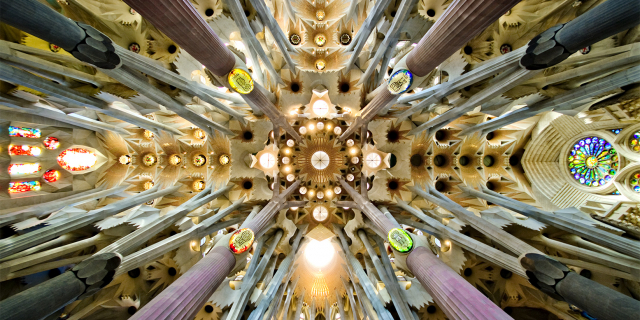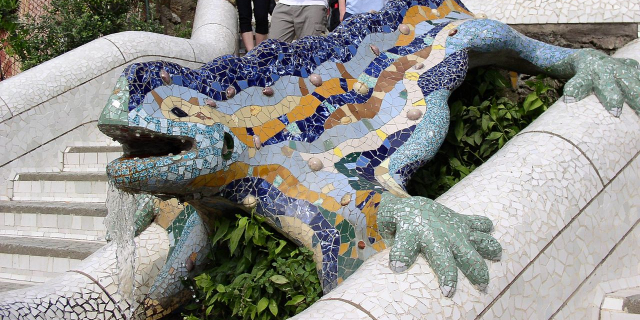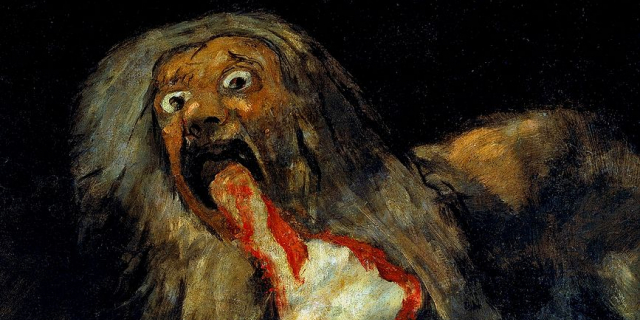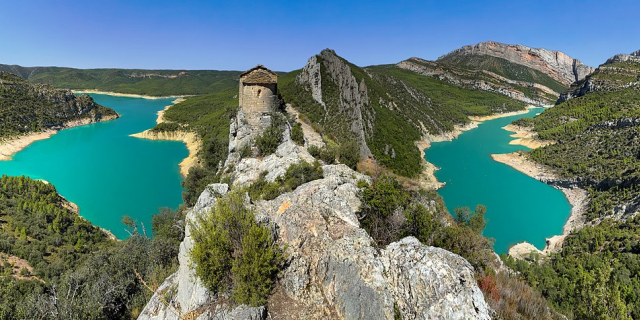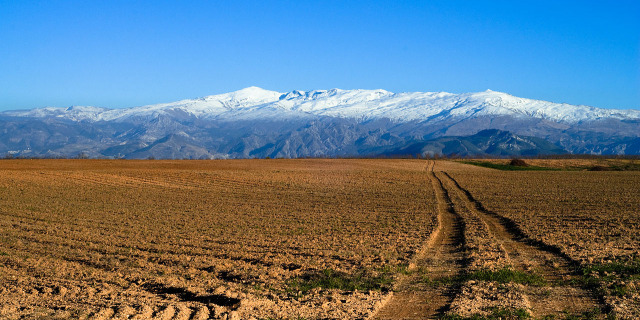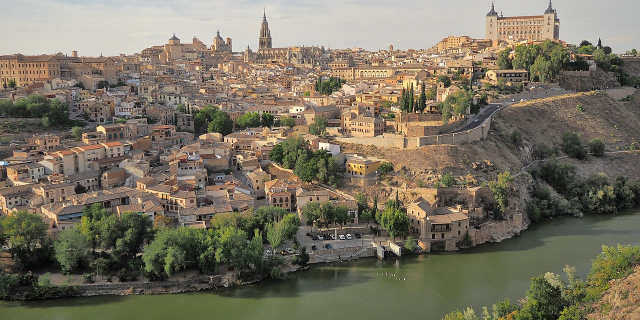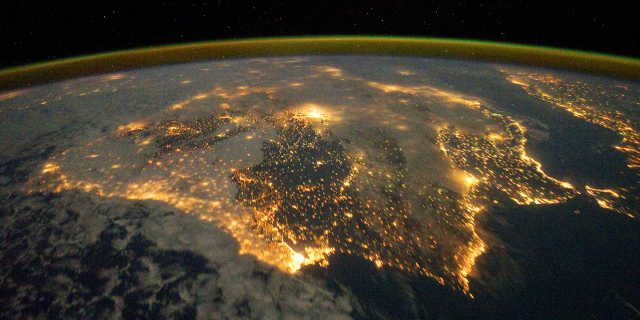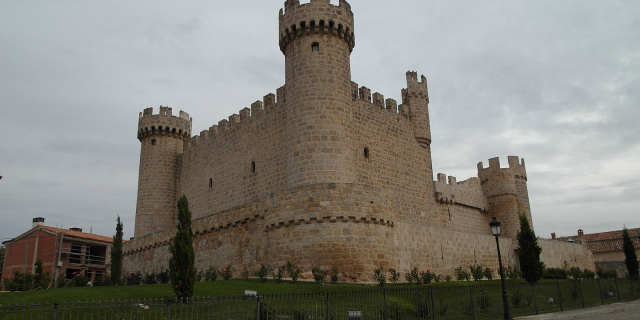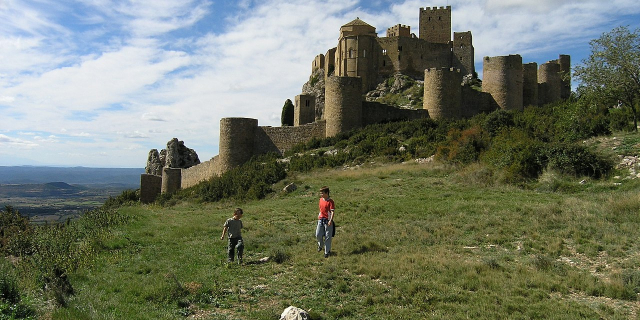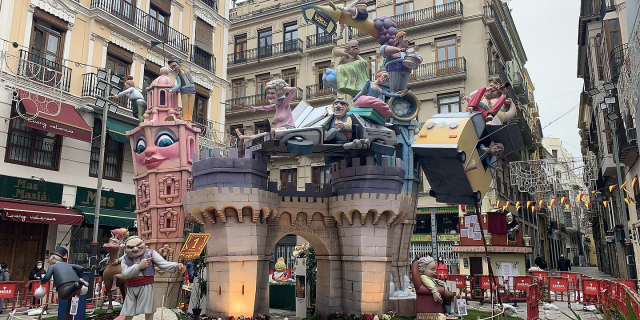España
SpainContext of Spain
Spain (Spanish: España, [esˈpaɲa] (listen)), or the Kingdom of Spain (Reino de España), is a country primarily located in southwestern Europe with parts of territory in the Atlantic Ocean and across the Mediterranean Sea. The largest part of Spain is situated on the Iberian Peninsula; its territory also includes the Canary Islands in the Atlantic Ocean, the Balearic Islands in the Mediterranean Sea, and the autonomous cities of Ceuta and Melilla in Africa. The country's mainland is bordered to the south by Gibraltar; to the south and east by the Mediterranean Sea; to the north by France, Andorra and the Bay of Biscay; and to the west by Portugal and the Atlantic Ocean. With an area of 505,990 km2<...Read more
Spain (Spanish: España, [esˈpaɲa] (listen)), or the Kingdom of Spain (Reino de España), is a country primarily located in southwestern Europe with parts of territory in the Atlantic Ocean and across the Mediterranean Sea. The largest part of Spain is situated on the Iberian Peninsula; its territory also includes the Canary Islands in the Atlantic Ocean, the Balearic Islands in the Mediterranean Sea, and the autonomous cities of Ceuta and Melilla in Africa. The country's mainland is bordered to the south by Gibraltar; to the south and east by the Mediterranean Sea; to the north by France, Andorra and the Bay of Biscay; and to the west by Portugal and the Atlantic Ocean. With an area of 505,990 km2 (195,360 sq mi), Spain is the second-largest country in the European Union (EU) and, with a population exceeding 47.4 million, the fourth-most populous EU member state. Spain's capital and largest city is Madrid; other major urban areas include Barcelona, Valencia, Seville, Zaragoza, Málaga, Murcia, Palma de Mallorca, Las Palmas de Gran Canaria, and Bilbao.
Anatomically modern humans first arrived in the Iberian Peninsula around 42,000 years ago. The ancient Iberian and Celtic tribes, along with other local pre-Roman peoples, dwelled the territory maintaining contacts with foreign Mediterranean cultures. The Roman conquest and colonization of the peninsula (Hispania) ensued, bringing the Romanization of the population. Receding of Western Roman imperial authority ushered in the migration into Iberia of tribes from Central and Northern Europe with the Visigoths as the dominant power in the peninsula by the fifth century. In the early eighth century, most of the peninsula was conquered by the Umayyad Caliphate, and during early Islamic rule, Al-Andalus became a dominant peninsular power centered in Córdoba. Several Christian kingdoms emerged in Northern Iberia, chief among them León, Castile, Aragon, Portugal, and Navarre made an intermittent southward military expansion, known as Reconquista, repelling the Islamic rule in Iberia, which culminated with the Christian seizure of the Emirate of Granada in 1492. Jews and Muslims were forced to choose between conversion to Catholicism or expulsion, and eventually the converts were expelled through different royal decrees.
The dynastic union of the Crown of Castile and the Crown of Aragon in 1479, often considered the formation of Spain as a country, was followed by the annexation of Navarre and the incorporation of Portugal during the Iberian Union. A major country of the Age of Discovery, Spain began the colonization of the New World in 1492 developing one of the largest empires in history and underpinned the emergence of a global trading system primarily fuelled by precious metals. Centralisation and further state-building in mainland Spain ensued in the 18th century with the Bourbon reforms. In the 19th century the Crown saw the independence of its American colonies as a result of cumulative crises and political divisions after the Peninsular War. Political instability reached its peak in the 20th century with the Spanish Civil War, giving rise to the Francoist dictatorship that lasted until 1975. With the restoration of democracy under the Constitution of Spain and the entry into the European Union, the country experienced profound economic, political and social change.
The so-called Siglo de Oro was a period of flourishing in arts and literature in Spain, coinciding with the political rise of the Spanish Empire under the Catholic Monarchs and the Spanish Habsburgs. As such, Spanish art, music, literature and cuisine have been influential worldwide, particularly in Western Europe and the Americas. As a reflection of its large cultural wealth, Spain has one of the world's largest numbers of World Heritage Sites and is the world's second-most visited country. Its cultural influence extends over 570 million Hispanophones, making Spanish language the world's second-most spoken native language and the world's most widely spoken Romance language.
Spain is a developed country ranked 27th in the Human Development Index, a secular parliamentary democracy and a constitutional monarchy, with King Felipe VI as head of state. It is a high-income country and an advanced economy, with the world's sixteenth-largest economy by nominal GDP and the sixteenth-largest by PPP. It is a world leader in organ transplants and organ donation. Spain is a member of the United Nations, the European Union, the Eurozone, the Council of Europe (CoE), de facto member of the G20, the Organization of Ibero-American States (OEI), the Union for the Mediterranean, the North Atlantic Treaty Organization (NATO), the Organisation for Economic Co-operation and Development (OECD), Organization for Security and Co-operation in Europe (OSCE), the World Trade Organization (WTO), and many other international organisations.

